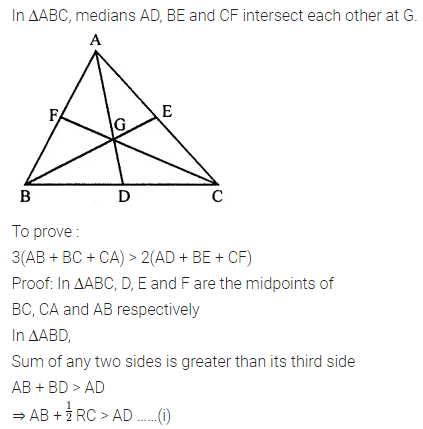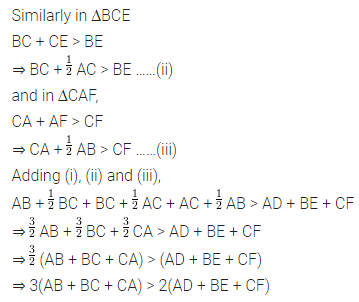ML Aggarwal Class 7 Solutions Chapter 11 Triangles and its Properties Objective Type Questions for ICSE Understanding Mathematics acts as the best resource during your learning and helps you score well in your exams.
ML Aggarwal Class 7 Solutions for ICSE Maths Chapter 11 Triangles and its Properties Objective Type Questions
Mental Maths
Question 1.
Fill in the blanks:
(i) A triangle has at least ………… acute angles.
(ii) A triangle cannot have more than ……… right angle.
(iii) A triangle cannot have more than ………… obtuse angle.
(iv) In every triangle, the sum of (interior) angles of a triangle = ……….. right angles.
(v) In every triangle, an exterior angle + adjacent interior angle = ………… degrees.
(vi) In every triangle, an exterior angle = sum of the …….. interior opposite angles.
(vii) In a right-angled triangle, if one of the acute angles measures 25° then the measure of the other acute angle is …………
Solution:
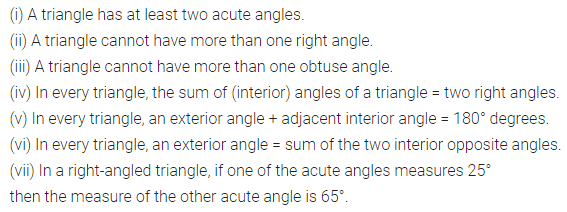
Question 2.
State whether the following statements are true (T) or false (F):
(i) A triangle can have all three angles with a measure greater than 60°.
(ii) A triangle can have all three angles with a measure of less than 60°.
(iii) If an exterior angle of a triangle is a right angle, then each of its interior opposite angles is acute.
(iv) In a right-angled triangle, the sum of two acute angles is 90°.
(v) If all the three sides of a triangle are equal, then it is called a scalene triangle.
(vi) Every equilateral triangle is an isosceles triangle.
(vii) Every isosceles triangle must be an equilateral triangle.
(viii) Each acute angle of an isosceles right-angled triangle measures 60°.
(ix) A median of a triangle always lies inside the triangle.
(x) An altitude of a triangle always lies outside the triangle.
(xii) In a triangle, the sum of squares of two sides is equal to the square of the third side.
Solution:
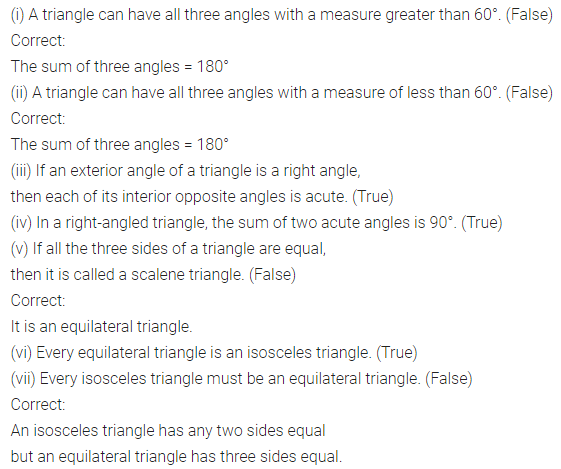
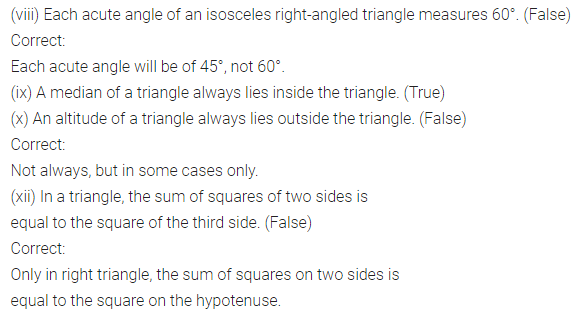
Multiple Choice Questions
Choose the correct answer from the given four options (3 to 17):
Question 3.
A triangle formed by the sides of lengths 4.5 cm, 6 cm, and 4.5 cm is
(a) scalene
(b) isosceles
(c) equilateral
(d) none of these
Solution:

Question 4.
The number of medians in a triangle is
(a) 1
(b) 2
(c) 3
(d) 4
Solution:
![]()
Question 5.
An exterior angle of a triangle is 125°. If one of the two interior opposite angles is 55° then the other interior opposite angle is
(a) 70°
(b) 55°
(c) 60°
(d) 80°
Solution:

Question 6.
In a ∆ABC, if ∠A = 40° and ∠B = 55° then ∠C is
(a) 75°
(b) 80°
(c) 95°
(d) 85°
Solution:

Question 7.
If the angles of a triangle are 35°, 35°, and 110°, then it is
(a) an isosceles triangle
(b) an equilateral triangle
(c) a scalene triangle
(d) right-angled triangle
Solution:

Question 8.
A triangle whose two angles measure 30° and 120° is
(a) scale
(b) isosceles
(c) equilateral
(d) none of these
Solution:

Question 9.
A triangle can have two
(a) right angles
(b) obtuse angles
(c) acute angles
(d) straight angles
Solution:
![]()
Question 10.
A triangle whose angles measure 35°, 35° and 90° is
(a) acute-angled
(b) right-angled
(c) obtuse-angled
(d) isosceles
Solution:

Question 11.
A triangle is not possible whose angles measure
(a) 40°, 65°, 75°
(b) 50°, 56°, 74°
(c) 72°, 63°, 45°
(d) 67°, 42°, 81°
Solution:

Question 12.
If in an isosceles triangle, each of the base angles is 40°, then the triangle is
(a) right-angled triangle
(b) acute-angled triangle
(c) obtuse-angled triangle
(d) isosceles right-angled triangle
Solution:

Question 13.
A triangle is not possible with sides of lengths (in cm)
(a) 6, 4, 10
(b) 5, 3, 7
(c) 7, 8, 9
(d) 3.6, 5.4, 8
Solution:

Question 14.
Which of the following can be the length of the third side of a triangle whose two sides measure 18 cm and 14 cm?
(a) 32 cm
(b) 3 cm
(c) 4 cm
(d) 5 cm
Solution:

Question 15.
In a right-angled triangle, the lengths of two leg’s are 6 cm and 8 cm. The length of the hypotenuse is
(a) 14 cm
(b) 10 cm
(c) 11 cm
(d) 12 cm
Solution:
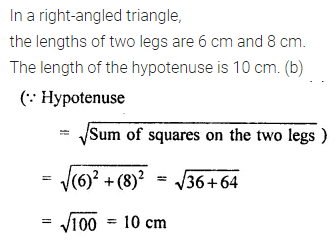
Question 16.
If the dimensions of a rectangle are 15 m and 8 m, then the length of a diagonal is
(a) 7 m
(b) 23 m
(c) 17 m
(d) 20 m
Solution:

Question 17.
If p, q, and r are the lengths of the three sides of a triangle, then which of the following statements is correct?
(a) p + q = r
(b) p + q < r (c) p + q > r
(d) p – q > r
Solution:

Higher Order Thinking Skills (HOTS)
Question 1.
In ∆DEF, DM and EN are two medians. Prove that 3(DF + EF) > 2(DM + EN).
Solution:
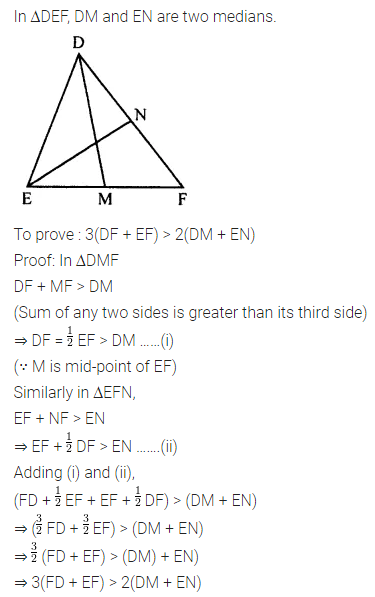
Question 2.
In a ∆ABC, medians AD, BE and CF intersect each other at point G. Prove that 3(AB + BC + CA) > 2(AD + BE + CF).
Solution:
